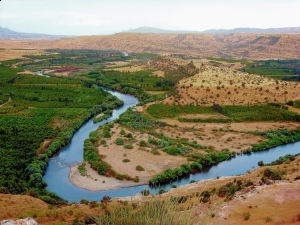Monday 7 September 2015

Photo, left: Greater Zab River near Erbil, capital of Kurdistan. See Hour 4, below, anent the Battle of Gaugamela on the Nineveh Plain. Note that the John Batchelor Show reported from near Gaugamela in Kurdistan, in northern Iraq, in late December 2014.
Here's how amateur historians who live there today explained it to the show's producer: Alexander marched from West to East; on the way, he defeated the Persian emperor, Darius III. On Alexander's return westward from present-day Afghanistan, he fought and won in Egypt, Gaza, and Tyre. Darius III realized that Alexander would again challenge him in battle and moved to forestall that:
Wikipedia: Darius started to prepare for another battle after the failure of the second negotiation attempt. Even so, he made a third and final effort to negotiate after Alexander's departure from Egypt. Darius' third offer was much more generous. He praised Alexander for the treatment of his mother Sisygambis and offered him all territory west of the Euphrates, co-rulership of the Achaemenid Empire, the hand of one of his daughters and 30,000 talents of silver. In the account of Diodorus, Alexander deliberated this offer with his friends. Parmenion was the only one who spoke up, saying, "If I were Alexander, I should accept what was offered and make a treaty." Alexander reportedly replied, "So should I, if I were Parmenion." Alexander again refused the offer of Darius, insisting that there could be only one king of Asia. He called on Darius to surrender to him or to meet him in battle to decide who was to be the sole king of Asia
. . . The battle began with the Persians' already present at the battlefield. Darius had recruited the finest cavalry from his Eastern satrapies and from an allied Scythian tribe and deployed scythed chariots, for which he had ordered bushes and vegetation removed from the battlefield to maximize their effectiveness. He also had 15 Indian elephants supported by Indian chariots.
https://en.wikipedia.org/wiki/File:Battle_of_Gaugamela,_331_BC_-_Opening_movements.png
Initial dispositions and opening movements. Darius placed himself in the centre with his best infantry as was the tradition among Persian kings. He was surrounded by, on his right, the Carian cavalry, Greek mercenaries, and the Persian horse guards. In the right-center he placed the Persian foot guards (Apple Bearers/Immortals to the Greeks), the Indian Cavalry and his Mardian archers.
In the event, Alexander used a strategy still studied today in the world's military schools: he broke through the center of Darius's army, separated it into indefensible smaller units, and caused the Persians to flee. Darius was so terrified at his second major defeat that he turned and fled without even his crown, his shield or his chariot. One of Alexander's lieutenants followed Darius for several days, then found and killed him. Alexander was taken by surprise and mourned Darius's loss – "A worthy enemy" – so buried his remains in a magnificent tomb. Not many days later, Alexander died.
JOHN BATCHELOR SHOW
Hour One
Monday 7 September 2015 / Hour 1, Block A: The Sea and Civilization: A Maritime History of the World , by Lincoln Paine (1 of 8)
Monday 7 September 2015 / Hour 1, Block B: The Sea and Civilization: A Maritime History of the World , by Lincoln Paine (2 of 8)
Monday 7 September 2015 / Hour 1, Block C: The Sea and Civilization: A Maritime History of the World , by Lincoln Paine (3 of 8)
Monday 7 September 2015 / Hour 1, Block D: The Sea and Civilization: A Maritime History of the World , by Lincoln Paine (4 of 8)
Hour Two
Monday 7 September 2015 / Hour 2, Block A: The Sea and Civilization: A Maritime History of the World , by Lincoln Paine (5 of 8)
Monday 7 September 2015 / Hour 2, Block B: The Sea and Civilization: A Maritime History of the World , by Lincoln Paine (6 of 8)
Monday 7 September 2015 / Hour 2, Block C: The Sea and Civilization: A Maritime History of the World , by Lincoln Paine (7 of 8)
Monday 7 September 2015 / Hour 2, Block D: The Sea and Civilization: A Maritime History of the World , by Lincoln Paine (8 of 8)
Hour Three
Monday 7 September 2015 / Hour 3, Block A: Devin Nunes (CA-22), Chairman of House Select Committee on Intelligence; and Gordon Chang, Forbes.com, in re: Lajes and the DoD (1 of 2)
Monday 7 September 2015 / Hour 3, Block B: Devin Nunes (CA-22), Chairman of House Select Committee on Intelligence; and Gordon Chang, Forbes.com, in re: Lajes and the DoD (2 of 2)
Monday 7 September 2015 / Hour 3, Block C: Richard A Epstein, Hoover Institution; Chicago and NYU Law; in re: Labor Day, and American unions in 2015 (1 of 2)
Monday 7 September 2015 / Hour 3, Block D: Richard A Epstein, Hoover Institution; Chicago and NYU Law; in re: Labor Day, and American unions in 2015 (2 of 2)
Hour Four
Monday 7 September 2015 / Hour 4, Block A: Moment of Battle: The Twenty Clashes That Changed the World, by Jim Lacey and Williamson Murray (1 of 4)
Monday 7 September 2015 / Hour 4, Block B: Moment of Battle: The Twenty Clashes That Changed the World, by Jim Lacey and Williamson Murray (2 of 4)
Monday 7 September 2015 / Hour 4, Block C: Moment of Battle: The Twenty Clashes That Changed the World, by Jim Lacey and Williamson Murray (3 of 4)
Monday 7 September 2015 / Hour 4, Block D: Moment of Battle: The Twenty Clashes That Changed the World, by Jim Lacey and Williamson Murray (4 of 4)